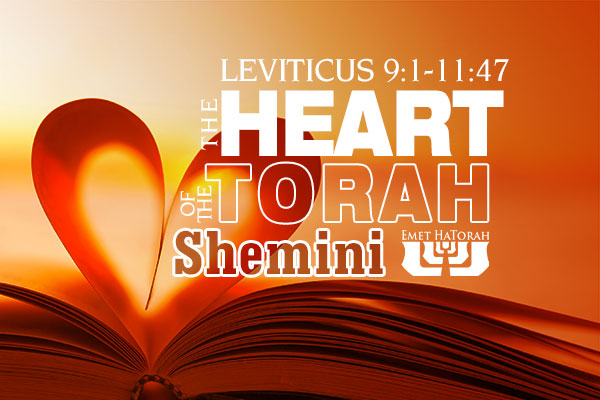Parashat Shemini - Leviticus 9:1-11:47
Series:

Parashat Shemini covers the inauguration procedures for the service of the Tabernacle, as well as the dietary laws that spell out which animals are fit for consumption. Sandwiched between these topics we learn about a tragic event that results in the death of Aaron’s sons, Nadab and Abihu. They attempt to approach Hashem on their own terms by bringing “unauthorized fire” into the presence of the Holy One of Israel. The event that follows is horrific. The Torah tells us, “Fire came out from before the LORD and consumed them, and they died before the LORD” (Leviticus 10:2).
After this tragedy, Moses instructed Aaron, Eleazar, and Ithamar (Aaron’s two surviving sons) on the details of eating the various offerings that were used for the service. But when the service was complete Moses realized that one of the offerings was not eaten, but entirely consumed on the fire. He became angry at Eleazar and Ithamar for not eating of it and began chastising them for this. Immediately, Aaron responded to his accusations and justified the actions of his sons. Who was right? Aaron or Moses?
Before we look to the answer, we need to understand what Moses did in this situation. Most Bible translations will say something like, “Moses searched diligently” for an answer to this dilemma. However, the Hebrew is a little more interesting. It uses the phrase, “darosh darash.” These are both two forms of the same Hebrew word, whose root means “to search out.” What is even more significant about this phrase describing Moses’ intense inquiry is that these two words are believed to be at very center—the very heart—of the Torah.
Torah is all about searching and finding. Proverbs tells us, “It is the glory of God to conceal things, but the glory of kings is to search things out” (Proverbs 25:2). Yeshua tells us that we should continually “ask, seek, and knock.” The deeper we search, the more treasures we will find. We will always be able to find beautiful things on the surface. However, it’s only when we dig deep that we will discover the precious jewels that are waiting to be discovered. We can use this situation as an instance of digging to reveal hidden jewels.
The argument between Moses and Aaron is the first halachic debate we have recorded. The Torah had barely been given, yet there was confusion as to how it should be understood and adhered to. Since Moses was the one God used to teach the Children of Israel His divine Law and he had already thoroughly searched out the matter, one would imagine that the instruction of Moses would be the final word in this case. However, in the end, Moses humbly admits that he is in the wrong and that Aaron is the one who has ruled correctly.
We can all learn an important lesson here. Moses searched out the matter thoroughly, but still ended up being wrong. And although he made a wrong decision, it didn’t destroy him. He remains the greatest national leader in the history of Israel. Why? Because he was humble, “more than all people who were on the face of the earth” (Numbers 12:3). Moses didn’t have an issue with his ego. His humility allowed him to admit when he was wrong, but continue to be able to teach and lead others. Rabbi Tzadok taught his disciples, “Do not make the Torah a crown with which to aggrandize yourself, nor use it as a spade with which to dig” (Avot 4:7). Digging deep into the Torah will fill the treasure houses of our hearts. But if we only dig to endorse our dogma, then we have missed the heart of the Torah.








